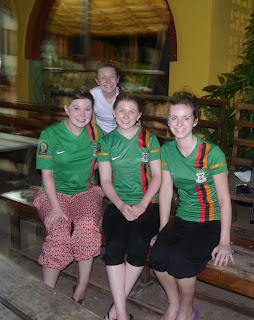After the professional shock I received
during my first week of teaching, I feel that it is only appropriate that I
develop my reflections on the Zambian Education system.
As Jenna and I finished our second week
of teaching, I finally feel that we have developed a routine in our lesson
planning and teaching, allowing us to put our Northern Irish teaching methods
to good use. The fact that we have been placed in one classroom has most
definitely improved the quality of teaching we have been able to provide, as
one of us can act as a classroom assistant – working with groups of children to
provide differentiation, writing information of the blackboard (a huge time
saver during lessons) and simply being a reassuring face at the back of the
room when lesson are not going to plan – while the other teaches. Furthermore,
it has provided professional development, in the form of liaising closely with
another teacher and developing my ability to “deploy, organise and guide the
work of other adults to support pupil’s learning” (Competence 16) (GTCNI, 2011,
p.14), skills which will be easily transferable to the Northern Ireland (NI)
schooling system.
As with the NI curriculum, the Zambian
curriculum is divided into a number of areas/subjects – these include:
Mathematics, English, Science, Creative and Technology Studies (C.T.S), Social
Development Studies, Chitonga (the local language), Literacy and Community studies
– however, the similarities end there. As the NI curriculum places an emphasis
on the importance of developing “links between different aspects of learning” (CCEA,
2007, p.10), the Zambian system opts for subject separation. After the little time I have spent observing
and teaching in Holycross Basic school – seeing the opportunities to provide
links between subjects - and my experience from school based work in NI, I
personally support Cohen et al’s (1996)
suggestion that compartmentalising subjects can prevent important links being explored,
resulting in key concepts which straddle subject boundaries to be neglected.
 |
| Vanessa - Our Star of the week. |

 During my time in school, I have
observed a number of teachers and been in a range of classrooms, all of which
have been completely different experiences. Each teacher has their own methods,
similar to the way teachers in Northern Ireland differ. Many of the teachers do
the best they can with the little they have – making visual aids and resources to
aid the children’s learning – but this is a very difficult task, as I have
found out over the last week. I am doing my best to make suitable visual aids
and wall displays, with the aim of developing the children’s learning and
making myself feel more at home in the classroom.
During my time in school, I have
observed a number of teachers and been in a range of classrooms, all of which
have been completely different experiences. Each teacher has their own methods,
similar to the way teachers in Northern Ireland differ. Many of the teachers do
the best they can with the little they have – making visual aids and resources to
aid the children’s learning – but this is a very difficult task, as I have
found out over the last week. I am doing my best to make suitable visual aids
and wall displays, with the aim of developing the children’s learning and
making myself feel more at home in the classroom. |
| Our table rewar chart and Star of the week award, which are working very well. |
 |
| An image used in the making of a 'sound story' during an English lesson. |
Jenna and I had the opportunity to
attend a Literacy training session which took part in our school; this was an
experience that I will never forget. The course was due to run from 8.00am to
5.00pm, a very long day in the boiling heat. From what I was able to
understand, the course leaders were pushing the idea of differentiation of
children into literacy groups, with the aim of improving the reading standards
in the schools. It was promising to see this type of training taking place.
However, I am not sure how seriously the teachers will take the recommendations
as the seemed more concerned about deciding on the group names (spending over
half the time disusing this), than the core literacy skills required.
Nevertheless, it is a step in the right direction to improving the reading
skills of the children and I have seen my class teacher implementing a number
of the techniques suggested.
After my third week of teaching, I am
really enjoying the challenges and rewards which come with teaching in Africa.
The children are starting to open up in the classroom, warming to me as a
teacher (which is a really amazing
experience for me) and they are beginning to work well in groups – Which is
the strategy I have decided to implement for the basis of my International Study
Project.
References
CCEA (2007) Northern Ireland Curriculum- Primary: Belfast, CCEA.
Cohen, L, Manion, L and Morrison, K
(1996) A Guide to Teaching Practice
(4th Edition). London: Routledge.
General Teaching Council for Northern
Ireland. (2010) Teaching: The Reflective
Profession, GTCNI, Belfast.


















